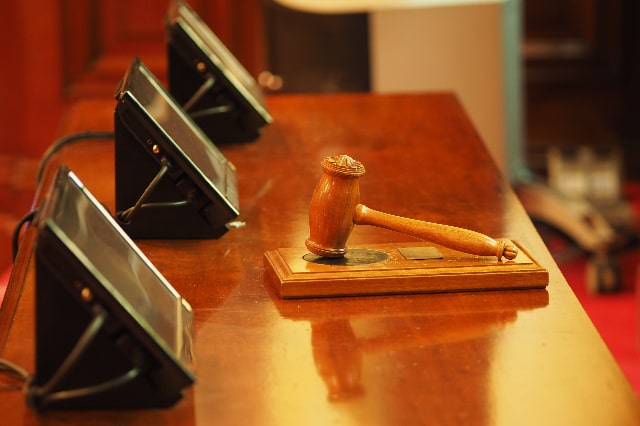Trusted criminal defense lawyer
Don’t risk your freedom! Learn how to avoid or defend against bench warrants in Georgia with Conoscienti and Ledbetter and ensure peace of mind today.
 Author: J. Blake Ledbetter, Partner, Conoscienti & Ledbetter
Author: J. Blake Ledbetter, Partner, Conoscienti & Ledbetter
Mr. Ledbetter specializes in civil litigation in metropolitan Atlanta, Georgia, and possesses vast experience in wrongful death lawsuits. Mr. Ledbetter was recognized as a SuperLawyers Rising Star in 2018 and 2019 in the area of Civil Litigation. Published on April 23, 2024.

Speak with experienced criminal defense lawyer today, for free.
Have you ever wondered what might compel a judge to demand your immediate court appearance? A bench warrant in Georgia is a directive issued by a judge that authorizes law enforcement to bring an individual before the court. This legal instrument is a critical component of the judicial system’s authority, which stretches beyond the courtroom walls and into the realm where individuals live and work. Imagine being in the middle of a routine day when suddenly you are required to answer for an alleged violation or to fulfill a legal obligation.
The genesis of a bench warrant can arise from various situations, such as failure to appear in court on a scheduled date, disregarding a court order, or being indicted by a grand jury. The implications of ignoring a bench warrant are far-reaching, potentially leading to an arrest at home, work, or during a routine traffic stop. Why is addressing a bench warrant with alacrity pivotal? It speaks to the heart of one’s legal well-being—delay can mean detention and additional legal troubles, intensifying an already stressful situation.
Our firm, Conoscienti and Ledbetter, stands committed to navigating the complexities of legal processes for our clients in Georgia. We understand the seriousness of a bench warrant and the importance of prompt and informed action. If confronted with this legal predicament, seeking skilled guidance can safeguard your rights and contribute to a resolution that is as favorable as possible under the circumstances. We are here to provide that guidance, ensuring that each step is taken with a clear understanding of the law and the protections it affords you.
Bench Warrants vs Arrest Warrants
Have you ever pondered the gravity of a missed court date? Bench warrants are a legal tool at the disposal of judges, reflecting the seriousness of failing to appear before the court. Imagine you’re summoned – you feel the weight of the law’s call. Yet, some may overlook this obligation, prompting a judge to issue a bench warrant. Now, why would a judge take such a step, and what does it mean for the individual involved?
Bench warrants in Georgia are governed by Georgia Code § 17-7-90. They are distinct from arrest warrants in their inception and usage. While arrest warrants are typically sought by law enforcement to apprehend someone suspected of a crime, a bench warrant is issued directly by a judge or an officer of the court when an individual disobeys a court order, such as failing to appear for a scheduled hearing.
Given the authority granted by this section of the Georgia Code, a judge can authorize the sheriff or another court officer to arrest and bring the individual to court. The primary purpose of this warrant is not to allege a new crime but to address non-compliance with a judicial directive.
Here’s a brief comparison to clarify:
Bench Warrant Arrest Warrant
Issued directly by a judge Requested by law enforcement and issued by a judge
Due to failure to appear or contempt of court orders In response to evidence of criminal activity
Executed by officers of the court Executed by police or law enforcement
The crux of judicial integrity and the enforcement of court orders, bench warrants serve a pivotal role within our jurisdiction. They uphold the court’s authority and ensure that individuals take their legal responsibilities seriously. Remember, while an arrest warrant is sparked by suspicion of criminal behavior, a bench warrant is a reaction to disregarding the judicial process. Can one afford to ignore a court’s explicit instruction when the consequences reverberate so profoundly?

Speak with trusted criminal defense lawyer today, for free.
Common Reasons for Bench Warrants in Georgia
Bench warrants are typically issued by judges when individuals fail to appear in court, requiring their presence to address charges or legal proceedings.
Here are some common reasons why bench warrants are issued in Georgia:
- Failure to Appear: Not showing up for court when required can result in a bench warrant.
- Unpaid Fines and Fees: Ignoring court-ordered payments may lead to enforcement through bench warrants, necessitating a court appearance to resolve financial obligations.
- Violation of Probation Terms: If the terms of probation are violated, such as not meeting required conditions, a bench warrant may be issued due to non-compliance with the court’s directives.
Understanding the common reasons for bench warrants in Georgia can help individuals navigate legal proceedings effectively and avoid potential consequences of non-compliance with court orders. For those who’ve enlisted legal representation, such as an Atlanta traffic ticket lawyer, failing to adhere to agreed payment schedules can complicate representation and affect case outcomes.
Consequences of a Bench Warrant
Bench warrants are court orders granting law enforcement the authority to take you into custody. This means an officer can arrest you at any moment, whether during a routine traffic stop or at your home or workplace, to bring you before the court.
Let’s consider the immediate consequences. Upon being arrested, you may be taken to jail and held there until a court date is scheduled. If the court permits, bail may be granted, which involves legal protocols and sometimes the validation of sureties.
Yet, the effects cascade beyond just the arrest. The existence of an outstanding bench warrant can lead to the suspension of a driver’s license through the Department of Driver Services. There’s the potential for it to interfere with employment, as background checks will reveal warrants to prospective employers, casting doubt on your reliability.
From a legal standpoint, fines and legal penalties await not just for the bench warrant but potentially for the initial offense tied to it. The prosecutor may see a failure to appear as a sign of disrespect, which could impact plea negotiations or sentencing.
In essence, the long-term impacts are multifaceted and enduring: your freedom, your reputation, and your wallet may all suffer. Should you find yourself dealing with a bench warrant, it’s imperative to address it promptly to mitigate these serious repercussions.

Don’t delay. Schedule a risk-free consultation today.
How to Handle a Bench Warrant in Georgia
Discovering that a bench warrant has been issued against you in Georgia can provoke a tidal wave of worry—but facing the issue head-on is essential. What next steps must you take? We’re here to outline them with clarity.
Firstly, it’s prudent to confirm the existence of a warrant. Numerous criminal record databases can facilitate this check. Once you’ve ascertained that a bench warrant is indeed active, swift action is required. Contacting an attorney who is well-versed in Georgia’s criminal defense procedure should be your priority. Navigating the complexities of legal resolutions is daunting without expert guidance.
Should a bench warrant be looming over you, it is imperative to appear in person at the court or get in touch with the court via phone to address the situation. Ignoring a bench warrant could further complicate matters, potentially resulting in arrest at any given moment.
Now, let’s break down the legalities. Under Georgia Code Section 17-6-11, an individual may waive arraignment if they choose to plead “not guilty”—a step that can be completed by mailing an appropriate plea to the courthouse. Here’s a synopsis of what this entails:
Step Action
Confirm the Warrant Use trusted online resources to verify the bench warrant’s existence.
Understand the Charges Review the specifics of the charges and the detailed expectations of appearance.
Seek Legal Representation Contact an attorney, as they can provide crucial guidance and potentially contest the warrant.
Contact the Courthouse Either appear in court or reach out by phone to address the bench warrant.
Address the Underlying Issue Resolve the core reason for the bench warrant; often, this implies settling unresolved legal matters.
Conoscienti & Ledbetter underscore the importance of a legal strategy tailored to your unique circumstances. A personalized legal approach is not just recommended; it’s vital when handling a bench warrant, as it ensures that every facet of your case is meticulously considered.
Remember, every step you take following the discovery of a bench warrant in Georgia can heavily influence the course of your case. Take informed actions, and grant yourself a fighting chance within the legal system.
How to Prevent a Bench Warrant
- flict is known, notify the proper court official.
- Document Communications: Ensure all communications are documented, typically through mail with a tracking number.
- Request to Reschedule: If necessary, a formal, written request to reschedule should be submitted.
Find Legal Representation
An attorney can be instrumental in managing court obligations that include:
- Representation: Having an attorney means having a liaison who can communicate with the court and the prosecutor on your behalf.
- Tailored Advice: They provide counsel on how to handle notices and avoid actions that may result in a bench warrant.
Avoid Compliance Failures
The simplest path to avoiding bench warrants is compliance. Here are steps everyone can follow:
- Track court dates: Diligently keep track of your court schedule.
- Understand your bail or bond conditions: Know your obligations, including sureties, and follow them to the letter.
- Respond to notices promptly: Any delay can be mistaken for evasion.
Contact Conoscienti and Ledbetter, LLC Today
At Conoscienti & Ledbetter, we bring a combined 43+ years of legal skill and experience straight to the doorstep of justice. Our attorneys, seasoned in criminal defense, navigate the complexities of the justice system with precision and dedication. Should you find yourself entwined with a bench warrant, understanding its implications is pivotal—prompt action can be the difference between freedom and detention.
A client-centered approach is the cornerstone of our practice. We believe each client deserves not just representation but representation tailored to their unique case. By developing robust defense strategies, we focus on achieving the best possible legal outcomes for you. This personal investment in our clients’ welfare has consistently fostered trust and esteem, earning us the reputation of being award-winning Atlanta lawyers.
We urge anyone facing legal issues to schedule a free consultation with us. This commitment to accessible legal counsel embodies our belief in justice for all, irrespective of one’s financial situation. With us, you gain the enlightenment to make informed decisions, and we offer our relentless advocacy every step of the way.
Decatur Office
(404) 373-5800
315 W Ponce de Leon Ave. Suite 400 Decatur, GA 30030








